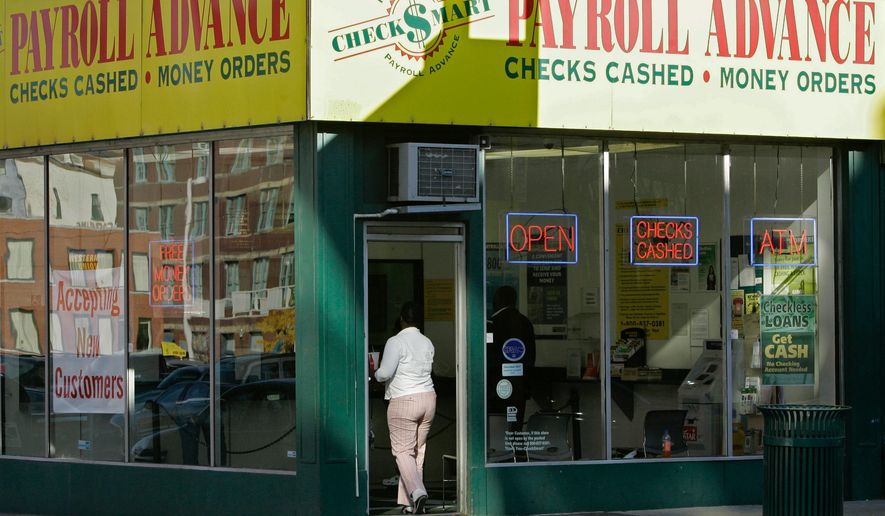The Obama administration’s consumer board will propose new restrictions on payday lenders Thursday, hoping to stop poor customers from ending up in a “debt trap” — and potentially chasing most of the lenders out of business.
The Consumer Financial Protection Bureau said payday lenders take advantage of cash-strapped customers, hooking them with short-term loans they can’t repay, then sticking them with even worse terms to get out of the debt.
The CFPB said it will require short-term loans to have to undergo many of the same underwriting requirements as regular loans, including a credit check to make sure borrowers have sufficient income, and restrictions on repeat loans to those who struggle to pay.
Finance organizations, though, said the new rules will end up punishing responsible consumers who know the risks but calculate that a payday loan is the best option. They’ll now be forced into even more costly arrangements such as missing payments and paying late fees, or relying on bank overdraft protections to cover short-term needs.
The CFPB had hinted for months that action was coming, and the battle lines have already been drawn, with a bipartisan group in Congress pushing for legislation to try to keep the new rules from taking effect.
And the attorneys general for a number of states have also weighed in over the last year, saying the states are already regulating businesses based on their own local circumstances. The lawyers questioned why the federal government needs to step in at all.
SEE ALSO: State Department admits Iran press conference edited, not a glitch
“This area of law has been traditionally occupied by the states, not the federal government,” South Dakota Attorney General Marty J. Jackley said in an Aug. 13, 2015, letter to CFPB Director Richard Cordray.
Similar letters were also written by attorneys general in Indiana, Alabama and Oklahoma.
Payday lenders have become an increasingly controversial part of the marketplace, with some consumer advocates and liberal pressure groups saying the businesses appear designed to take advantage of the poor or those who struggle with financial literacy.
But free-market advocates, many state government and business officials, and financial institutions say that while there may be some bad apples, many payday lenders serve as a valuable short-term bridge for consumers who need to get over a rough spot.
Payday customers themselves told The Washington Times last year that they are aware of the higher interest rates they’re paying, but said it was the best option for their needs. Some were denied a loan by a traditional bank, while others said they didn’t want to beg money from family.
Indeed, payday customer complaints account for less than 1 percent of the complaints filed with the CFPB — though the agency has spent a large amount of its time on the issue since the bureau began operating in 2011.
SEE ALSO: House investigation: Planned Parenthood broke federal law in fetal body parts trafficking
Payday loans usually amount to several hundred dollars, and last for a few weeks. A 15 percent interest rate for the period of the loan is fairly common, but some rates go as high as 75 percent, along with an initial loan fee.
The CFPB said “most consumers” end up unable to pay off immediately and have to renew their loans or reborrow soon after, which the bureau said can quickly add up to an annual percentage rate equivalent to 390 percent or more.
“The consumer pays more fees and interest each time they reborrow, turning a short-term loan over time into a long-term debt trap,” the agency said.
CFPB rules would apply to any loan that works out to more than a 36 percent APR and that either has access to a consumer’s deposit account, paycheck or car title as collateral.
In addition to checking customers’ ability to repay, payday lenders would also have to limit how often they could roll over a loan.
Lenders would have to give customers notice before trying to collect money directly from their accounts, and lenders would be prohibited from repeatedly pinging a customer’s account to try to get the money owed. Repeated unsuccessful attempts can add up to large bank fees for the customer.
• Stephen Dinan can be reached at sdinan@washingtontimes.com.




Please read our comment policy before commenting.